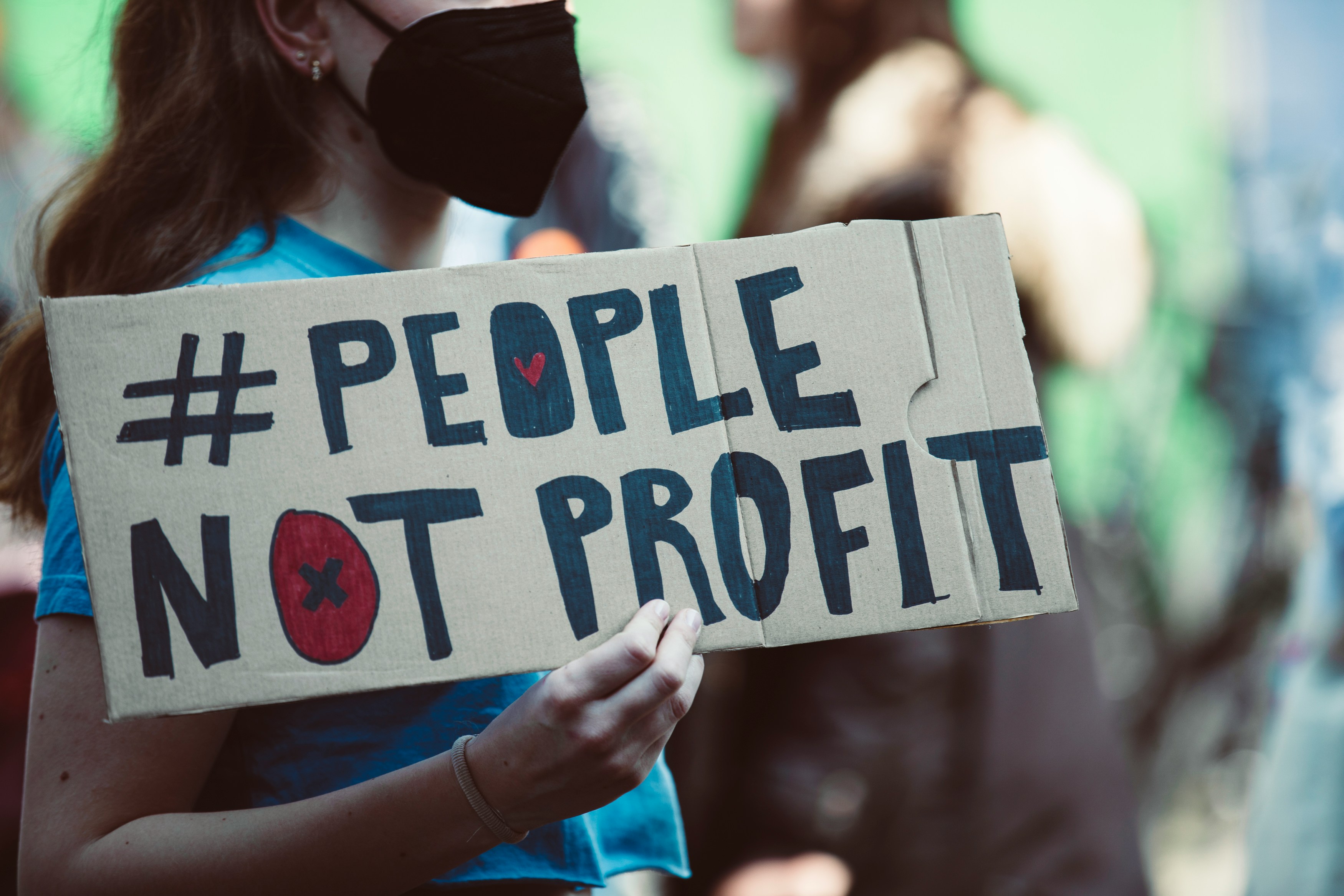Labor On Labor Day: Discomfort, Planning, and Building Anti-Capitalist Businesses
Sep 01, 2025
Labor Day feels like a good moment to pause and talk about… labor. Always labor. Not just jobs, but the labor of being human. The labor of parenting. The labor of running a business. The labor of building toward something better than capitalism.
Lately, I’ve been thinking a lot about the labor of the phrase: “I’m sure it’ll all work out.”
Because here’s the thing: does it? Does it actually just “work itself out”?
Let me tell you a story about my oldest son, Bo, and how his kindergarten drop-off cracked something open for me about discomfort, planning, and the work of liberation.
The Labor of Kindergarten Drop-Off
Bo is a true empath. Sensitive, emotionally attuned, thrives on one-on-one connection but not on crowds. Starting kindergarten last week was brutal for him.
The first two mornings, we stood outside a solid 30 minutes after the bell had rung, all the other kids already inside. Bo was in tears, distraught, not wanting to go into the building. Horrific. Excruciating.
And here’s a little “fun fact” for those of you who don’t have school-aged children: because our leaders have chosen the profits of the gun industry over the safety of kids, schools have had to lock parents out of the buildings. I’m not allowed to walk Bo to his classroom. Which I know, 100%, would resolve most of this issue.
Instead, I leave him at the door to walk into a huge building he doesn’t know, with hundreds of humans he doesn’t know. And once he’s in? He has a blast. He weaves into the fold, makes friends, plays games. But that entry? Painful, scary, and hard.
When I tell people about it, some well-meaning adults respond with, “Oh, he’ll be fine! Just wait, he’ll be running in in no time.”
And while I know it comes from kindness, it hasn’t felt all that helpful. Because it misses two important truths:
-
Adults are terrible at sitting with discomfort.
-
Things rarely “just work out.” They usually work out because someone made a plan.
Both of those truths apply to parenting. And both apply to business.
1. Learning to Sit With Discomfort
Adults love to skip discomfort. We deny it, minimize it, try to fix it right away. Or we push people to “just get over it.” But discomfort is as normal as breathing. It’s part of being human.
The trouble is: we resist it with everything we’ve got.
Parenting Example: Bo and the Bike
One morning last week, Bo woke up crying. (Baseline emotional + stress = more crying.) His reason: he thought the world was unfair because he has one bike and I have three. Loud crying, hot tears, the whole thing.
In that moment, I had choices:
-
I could say the “but” line: “Yes, mommy does have three bikes, BUT you have such a nice one, don’t you love it?”
-
I could get pissed: “Bo! Do you know how hard mommy and daddy worked to buy you that bike? How all four grandparents chipped in? You should feel grateful!”
-
I could dismiss him: “This is not something to cry about. Move on.”
Instead, I sat next to him. Rubbed his back. Said, “It’s so dang hard when things feel unfair.” And then I stopped talking.
I didn’t try to snap him out of it. Didn’t offer to buy another bike. Didn’t shame him for wishing. I just witnessed his pain.
And guess what? Ten minutes later, he was eating breakfast and playing Monopoly Junior with his uncle. The discomfort passed.
The Lesson
Discomfort doesn’t need to be erased. It needs to be witnessed. Whether it’s your kid crying about a bike, your client panicking about cash flow, or yourself spinning out in fear, the work isn’t to rush past it. The work is to sit with it.
2. Things Don’t “Work Out” Without a Plan
Here’s the other truth: “everything will be fine” is almost never true on its own. Things work out because someone made a plan.
Bo will eventually walk into school regulated and confident because his teacher, principal, support staff, and I created a plan together. We intervened.
And this applies directly to your business:
-
Waiting for your finances to sort themselves out? They won’t.
-
Hoping your sales magically increase? They won’t.
-
Thinking your workload will lighten on its own? It won’t.
Things work out when there’s an actual path forward.
The Spectrum of Planning
On the spectrum of “loosey goosey, go-with-the-flow spontaneity” to “structured, detailed, rigid,” I lean way to the latter. I’m a pragmatist, a realist, a detail person.
So when I hear “it’s all going to work out,” my question is: How? What’s the plan? Who’s responsible? What’s the timeline?
This is true in every part of life—whether it’s helping Bo walk through a scary doorway or helping you walk through a scary business decision.
What This Means for Your Business
I see so many small business owners get stuck in magical thinking:
-
“Clients will show up when they’re meant to.”
-
“The right offer will land eventually.”
-
“It’ll all balance itself out.”
But just like my son doesn’t magically stop crying about bikes, your business doesn’t magically start running smoothly. You need intervention. You need a plan.
That doesn’t mean you need to hustle harder or grind yourself down. A plan doesn’t have to be rigid or oppressive. In fact, a good plan is about care: care for yourself, care for your people, care for your community.
Activities to Try: Sitting With Discomfort
Here are a few things you can try this week to practice the first lesson—sitting with discomfort:
-
Notice your knee-jerk reaction. When someone shares something hard, do you rush to fix? Deflect? Minimize? Just notice.
-
Practice witnessing without fixing. Next time a friend or client shares discomfort, try a validating phrase like, “That sounds really hard,” or “Yeah, it makes sense you feel that way.” Stop there.
-
Sit with your own discomfort. When you feel anxious about money or business growth, write down what you’re feeling instead of pushing it away. Name it.
-
Build tolerance slowly. Start with five minutes of “being with” something uncomfortable—your kid’s meltdown, your inbox chaos, your own body’s signals—without fixing it. See what shifts.
Activities to Try: Making a Plan
And here are some concrete steps for practicing the second lesson—planning:
-
Ask “what outcome do I want?” Instead of hoping things improve, get specific about the result you want.
-
Break it down. What’s the next smallest step? Not the whole journey, just the next step.
-
Loop in support. Plans are stronger when they involve community. Talk with a coach, a peer, a teacher, or a comrade.
-
Write it down. A plan in your head is just a wish. A plan on paper is a path.
-
Review and adjust. No plan is perfect. Check in weekly, adjust as needed, and keep moving.
Why This Matters for Liberatory Business
Here’s the bigger connection: capitalism itself is one giant “it’ll work out” story. We’re told the “free market” will balance itself. That wealth will “trickle down.” That competition magically makes things better.
We know that’s bullshit.
The collapse of capitalism will happen eventually, but too late. If we want a post-capitalist world in our lifetimes, we can’t wait around for things to “work out.” We need a plan. A plan for our finances. A plan for our businesses. A plan for how we care for each other.
That’s exactly what we’re doing in Liberatory Finance. We’ve brought together 50+ small business owners who want to do money differently. Who want a plan that leads not just to survival, but to liberation.
And if you want support one-on-one, that’s the work of my Anti-Capitalist Business Coaching. Together, we create plans rooted in values, community, and care—not exploitation.
The Fruit Tree Reminder
There’s an old saying: the best day to plant a fruit tree was ten years ago. The second best day is today.
Same with your business. The best day to get clarity on your finances was the day you started. The second best day is now.
Bringing It Back to Bo
At school drop-off, my job isn’t to erase Bo’s fear. It’s to sit with him in it. To remind him he’s not alone. And to work with his community to make a plan.
That’s our job in business too: sit with the discomfort, and make a plan. That’s how things “work out.”
If you’re already registered for Liberatory Finance, I’m so glad you said yes. If you’ve been waiting, forgot, or wondering if now’s the right time—this is your invitation.
See you soon, comrade.
—Emily
We hate SPAM. We will never sell your information, for any reason.






